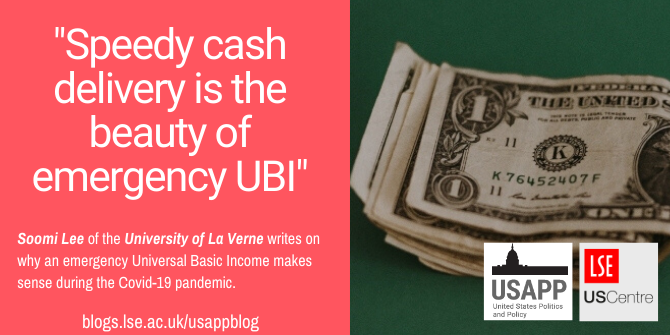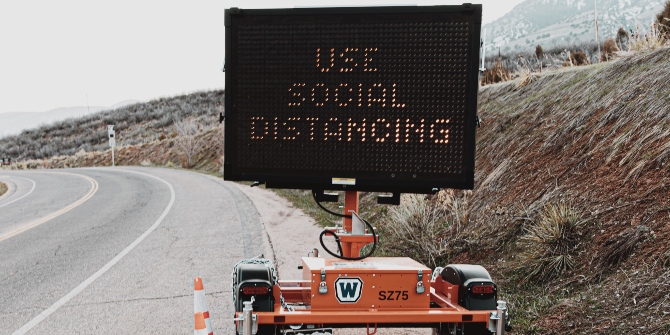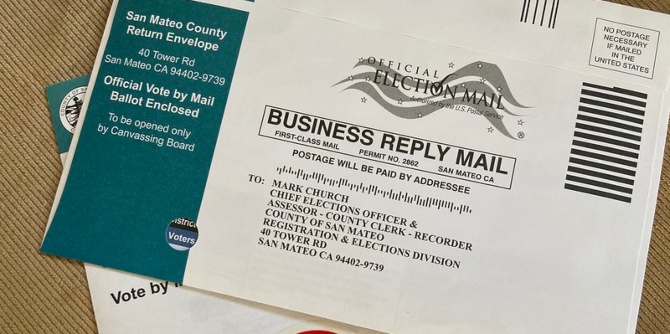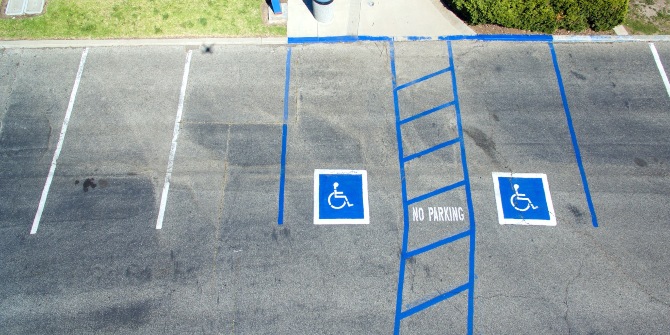 Aside from the human cost, the Covid-19 pandemic is expected to have massive negative effects on the worldwide economy. Soomi Lee writes that the introduction of an emergency Universal Basic Income would help reduce the effects of the expected downturn and provide some financial security for people by immediately giving all adult Americans $1,000, regardless of their circumstances.
Aside from the human cost, the Covid-19 pandemic is expected to have massive negative effects on the worldwide economy. Soomi Lee writes that the introduction of an emergency Universal Basic Income would help reduce the effects of the expected downturn and provide some financial security for people by immediately giving all adult Americans $1,000, regardless of their circumstances.
The Novel Coronavirus (Covid-19) and the Economy
“It’s an ice age.” That’s how one financial journalist recently described the economic impact of Covid-19 and the novel coronavirus that causes it. Factories, schools, businesses, government agencies and enterprises have shut down. J.P. Morgan and Goldman Sachs predict a 14-24 percent drop in second quarter Gross Domestic Product, which would be the largest quarterly contraction on record. In the week following US President Donald Trump’s declaration of a national emergency, unemployment insurance claims jumped 30 percent, representing 281,000 newly jobless people. Such claims are expected to grow by a factor of 10, reaching 2.8 million by the end of week 2.
To cushion the pandemic’s negative economic impact, a few politicians suggest what amounts to a form of emergency universal basic income (emergency UBI). One plan would rush a $1,000 check to each adult earning less than $75,000 a year. Children would get $500 apiece. A couple with two children would receive $3,000. This sort of emergency UBI was called for by more than 700 academics and public figures globally, and as judged by Google Trends, public interest in UBI is at an all-time high.
Note that the direct payment that is now considered in the economic stimulus package is a tax rebate that only benefits those who filed a tax return. And it is not the first time the federal government has considered it. The Bush administration implemented a similar tax rebate policy that sent two separate checks to tax filers in response to the 2008 financial crisis.
Universal Basic Income in the United States
In its purest form, universal basic income (UBI) is “a periodic cash payment unconditionally delivered to all on an individual basis, without means-test or work requirement.” It contrasts with temporary cash assistance, like unemployment benefits, that current welfare programs tend to offer. UBI does not test means; it’s given to everyone regardless of income. UBI does not require the receiver to do anything. Simply put, UBI is an entitlement of resources in all circumstances, while current cash assistance programs initially and constantly prove “deservingness.”
The history of UBI in the US is surprisingly rich and slightly confounding, as on its face such a scheme runs counter to the American ideal of resourceful individuals pulling themselves up by their bootstraps. And yet, American revolutionist Thomas Paine advocated a land-tax to fund a citizen dividend as compensation for “loss of his or her natural inheritance (Agrarian Justice 1795).” And in Progress and Poverty (1879), which at its peak was more widely read in the States than any book except the Bible, American journalist and economist Henry George proposed a dividend to all citizens funded by a land value tax.
Fast forward a century, and the economist Milton Friedman in 1962 proposed a negative income tax to guarantee a minimum income for all Americans. He argued that such a move would end the “welfare trap” and reduce government bureaucracy via the efficiency of free markets. Civil rights icon Martin Luther King Jr. endorsed the guaranteed income policy in 1967 and in 1968, more than 1,200 economists signed a statement urging the US Congress to introduce a system of income guarantees and supplements.
Around the same time, political conservatives grew keen on the idea of a guaranteed minimum income. In 1969, President Richard Nixon, a Republican, proposed the Family Assistance Plan based on the negative income tax model. It was a “shift from thinking of welfare as a nonenforceable privilege over to thinking of it as a legal right to stated benefits in response to objectively determined needs.” The plan would have provided an average family with a $1,600 per year, approximately $12,000 in 2020. It was neither universal nor unconditional but was the closest the country ever got to a national UBI.
In 1976, a truly universal and unconditional social dividend was enacted at the state level in Alaska. Voters there approved the Alaska Permanent Fund dividend. The state constitution was amended so that profits from Alaska’s natural resources were distributed to all residents (with one-year residency requirement). Now, each year, Alaskans receive $1,000-$2,000 cash from the state, no strings attached.

Photo by Annie Spratt on Unsplash
More recently, UBI has become a darling among some Silicon Valley tech CEOs, who, in the face of automation, see it as an inevitable “social vaccine for the 21st Century.” In 2019, businessman Andrew Yang ran for the Democratic Party’s presidential nomination on a UBI platform that he branded the Freedom Dividend. Because Yang repeatedly qualified for televised debates, millions of Americans were exposed to UBI and its potential relevance in today’s economy by an eloquent and passionate advocate.
Why Emergency UBI Gets Traction, Why It Makes Sense Now
A recession triggered by pandemic is different from other kinds of economic contraction. A downturn in two consecutive quarters as reflected in GDP is typically recognized as a recession, leading to government efforts to provide a more favorable business climate. Sometimes this works, sometimes it doesn’t, but the response normally takes months to implement.
In contrast, America’s proposed $2 trillion economic stimulus package aimed at countering Covid-19 is taking shape a lightning speed. That’s in part because lawmakers recognize they have two daunting challenges: to halt a genuine public health emergency and to save an economy. The traditional recession playbook is to lend money through monetary policy, cut taxes through fiscal policy, and encourage economic activity across the board: open businesses, go out to movie theaters, dine at restaurants, and go shopping. But with a virus in the air, this is exactly opposite to what governments are now pleading for people to do – namely to stay home. At this moment, Washington D.C.’s task is to stop the economy while immediately maintaining livelihood. And it is in these unique circumstances that emergency UBI seems suddenly plausible.
Yes, there is opposition. The Wall Street Journal editorial board argues that Congress can achieve the same goals with expanded jobless insurance, food-stamps, and mandated sick leave and that these are much better targeted at genuine hardship because “some people who will get the $1,000 won’t need it.”
Are they right? Can the existing programs handle the emergency? I am skeptical. First, only 12 states and Washington, D.C. have state-wide paid sick leave laws. Nationally, about 54 percent of service workers do not have access to such benefit. Those who have sick leave typically are capped at 5-6 days, not enough in the face of government mandated two-week lockdowns. Further, paid sick leave rules do not cover workers who practice voluntary quarantine. The benefits kick in only when workers have already become ill and symptomatic. Though Trump did expand paid leave benefits in responding to the pandemic, millions of workers remain ineligible.
Similarly, not all workers are eligible for unemployment insurance benefits. Workers must have earned enough income and worked long enough in the same company to be eligible. All determination for eligibility is made by the state and claims can be denied. In 2018, less than 30 percent of the unemployed received the benefits. While on the program, workers must file bi-weekly claims and report up all earnings, job offers, or refusal of work. Further, food stamps carry their own general work requirements, which for most people cannot be fulfilled during stay-in-shelter orders. On top of it, food stamps cannot be used for hygiene items, cleaning supplies, pet foods, hot foods, prepared foods, medicines, supplements, and vitamins.
Appeals of Emergency UBI in Pandemic
Workers are complying with measures to flatten the curve of Covid-19 for themselves and others. Millions, if not tens of millions of will people lose their job as a consequence. While the collective goal is to save lives, livelihoods must also be maintained, with or without a job. UBI effectively severs the link between work and people’s livelihood. Recipients needn’t prove job seeking activities or limit how they spend their money. That is the appeal of UBI in the Covid-19 public health emergency.
Millions of Americans need immediate financial relief. State governors and local officials insist that everyday counts. Because UBI does not require means-testing, it makes the administrative process faster than current relief programs. The usual vetting process of cash assistance—submitting applications and supporting documents to prove eligibility—will take too long for millions of people. Speedy cash delivery is the beauty of emergency UBI.
UBI is not a cure-all. Unless sustained, $1,000 will quickly pass through most people’s wallets. But it is emergency relief that can reach Americans fast as a baseline. And it is not exclusionary: Paid sick leave, unemployment benefits, and the food stamps programs can be added to the UBI.
Previously, much limited tax rebate checks in 2008 were reported to provide only a modest stimulus on spending. Because the circumstances are much different, the impact of emergency UBI on spending and growth in a pandemic is hard to predict. Finally, it has been shown in pilot programs around the globe over the last five years that UBI recipients report a greater general sense of well-being and economic security. At a time of societal stress like the current pandemic and its aftermath, that may prove especially valuable.
Please read our comments policy before commenting
Note: This article gives the views of the author, and not the position of USAPP– American Politics and Policy, nor of the London School of Economics.
Shortened URL for this post: https://bit.ly/2UvRzyS
About the author
 Soomi Lee – University of La Verne
Soomi Lee – University of La Verne
Soomi Lee is an associate professor of public administration at the University of La Verne. Her research focuses on state and local public finance and political economy. Her work on budget rules and their effects, effects of racial diversity on local finance, and public sentiment towards redistribution appeared in State Politics & Policy, Urban Affairs Review, and Basic Income Studies.







3 Comments